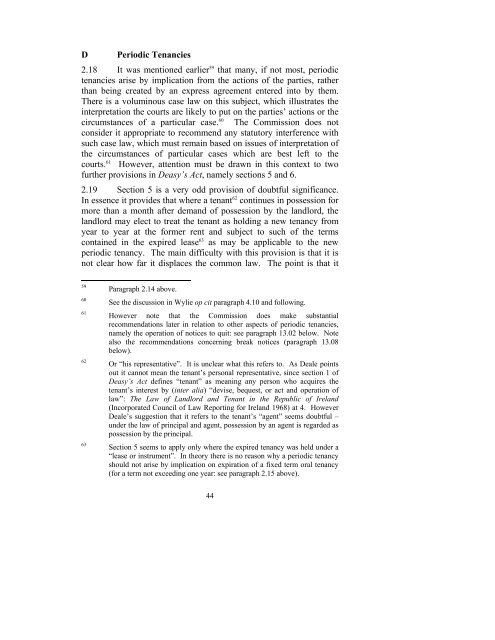Consultation Paper on the General Law of the Landlord and Tenant
Consultation Paper on the General Law of the Landlord and Tenant
Consultation Paper on the General Law of the Landlord and Tenant
You also want an ePaper? Increase the reach of your titles
YUMPU automatically turns print PDFs into web optimized ePapers that Google loves.
D Periodic Tenancies2.18 It was menti<strong>on</strong>ed earlier 59 that many, if not most, periodictenancies arise by implicati<strong>on</strong> from <strong>the</strong> acti<strong>on</strong>s <strong>of</strong> <strong>the</strong> parties, ra<strong>the</strong>rthan being created by an express agreement entered into by <strong>the</strong>m.There is a voluminous case law <strong>on</strong> this subject, which illustrates <strong>the</strong>interpretati<strong>on</strong> <strong>the</strong> courts are likely to put <strong>on</strong> <strong>the</strong> parties’ acti<strong>on</strong>s or <strong>the</strong>circumstances <strong>of</strong> a particular case. 60 The Commissi<strong>on</strong> does notc<strong>on</strong>sider it appropriate to recommend any statutory interference withsuch case law, which must remain based <strong>on</strong> issues <strong>of</strong> interpretati<strong>on</strong> <strong>of</strong><strong>the</strong> circumstances <strong>of</strong> particular cases which are best left to <strong>the</strong>courts. 61 However, attenti<strong>on</strong> must be drawn in this c<strong>on</strong>text to tw<strong>of</strong>ur<strong>the</strong>r provisi<strong>on</strong>s in Deasy’s Act, namely secti<strong>on</strong>s 5 <strong>and</strong> 6.2.19 Secti<strong>on</strong> 5 is a very odd provisi<strong>on</strong> <strong>of</strong> doubtful significance.In essence it provides that where a tenant 62 c<strong>on</strong>tinues in possessi<strong>on</strong> formore than a m<strong>on</strong>th after dem<strong>and</strong> <strong>of</strong> possessi<strong>on</strong> by <strong>the</strong> l<strong>and</strong>lord, <strong>the</strong>l<strong>and</strong>lord may elect to treat <strong>the</strong> tenant as holding a new tenancy fromyear to year at <strong>the</strong> former rent <strong>and</strong> subject to such <strong>of</strong> <strong>the</strong> termsc<strong>on</strong>tained in <strong>the</strong> expired lease 63 as may be applicable to <strong>the</strong> newperiodic tenancy. The main difficulty with this provisi<strong>on</strong> is that it isnot clear how far it displaces <strong>the</strong> comm<strong>on</strong> law. The point is that it5960616263Paragraph 2.14 above.See <strong>the</strong> discussi<strong>on</strong> in Wylie op cit paragraph 4.10 <strong>and</strong> following.However note that <strong>the</strong> Commissi<strong>on</strong> does make substantialrecommendati<strong>on</strong>s later in relati<strong>on</strong> to o<strong>the</strong>r aspects <strong>of</strong> periodic tenancies,namely <strong>the</strong> operati<strong>on</strong> <strong>of</strong> notices to quit: see paragraph 13.02 below. Notealso <strong>the</strong> recommendati<strong>on</strong>s c<strong>on</strong>cerning break notices (paragraph 13.08below).Or “his representative”. It is unclear what this refers to. As Deale pointsout it cannot mean <strong>the</strong> tenant’s pers<strong>on</strong>al representative, since secti<strong>on</strong> 1 <strong>of</strong>Deasy’s Act defines “tenant” as meaning any pers<strong>on</strong> who acquires <strong>the</strong>tenant’s interest by (inter alia) “devise, bequest, or act <strong>and</strong> operati<strong>on</strong> <strong>of</strong>law”: The <strong>Law</strong> <strong>of</strong> <strong>L<strong>and</strong>lord</strong> <strong>and</strong> <strong>Tenant</strong> in <strong>the</strong> Republic <strong>of</strong> Irel<strong>and</strong>(Incorporated Council <strong>of</strong> <strong>Law</strong> Reporting for Irel<strong>and</strong> 1968) at 4. HoweverDeale’s suggesti<strong>on</strong> that it refers to <strong>the</strong> tenant’s “agent” seems doubtful –under <strong>the</strong> law <strong>of</strong> principal <strong>and</strong> agent, possessi<strong>on</strong> by an agent is regarded aspossessi<strong>on</strong> by <strong>the</strong> principal.Secti<strong>on</strong> 5 seems to apply <strong>on</strong>ly where <strong>the</strong> expired tenancy was held under a“lease or instrument”. In <strong>the</strong>ory <strong>the</strong>re is no reas<strong>on</strong> why a periodic tenancyshould not arise by implicati<strong>on</strong> <strong>on</strong> expirati<strong>on</strong> <strong>of</strong> a fixed term oral tenancy(for a term not exceeding <strong>on</strong>e year: see paragraph 2.15 above).44
















